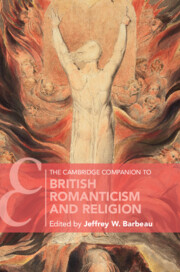Book contents
- The Cambridge Companion to British Romanticism and Religion
- The Cambridge Companion to British Romanticism and Religion
- Copyright page
- Contents
- Illustrations
- Contributors
- Acknowledgments
- Chapter 1 Introduction
- Part I Historical Developments
- Part II Literary Forms
- Chapter 9 Poetry
- Chapter 10 The Novel
- Chapter 11 Drama
- Chapter 12 Sermons and Lectures
- Chapter 13 Life Writing
- Part III Disciplinary Connections
- Index
- Cambridge Companions To …
- References
Chapter 10 - The Novel
from Part II - Literary Forms
Published online by Cambridge University Press: 01 October 2021
- The Cambridge Companion to British Romanticism and Religion
- The Cambridge Companion to British Romanticism and Religion
- Copyright page
- Contents
- Illustrations
- Contributors
- Acknowledgments
- Chapter 1 Introduction
- Part I Historical Developments
- Part II Literary Forms
- Chapter 9 Poetry
- Chapter 10 The Novel
- Chapter 11 Drama
- Chapter 12 Sermons and Lectures
- Chapter 13 Life Writing
- Part III Disciplinary Connections
- Index
- Cambridge Companions To …
- References
Summary
This chapter explores the relationship between religion and “the novel” by focusing on a cross-section of religious questions having to do with belonging (domestic, national, global) and identity. It begins with a consideration the Evangelical Hannah More’s Coelebs in Search of a Wife (1809), moves to a cluster of novels that contemplated domestic religious differences in the form of Catholics and Jews, and concludes with a shift outside the geographical boundaries of the United Kingdom and Ireland to examine early novelistic responses to overseas missionary movements, which raised challenging questions about empire, race, and religious community.
- Type
- Chapter
- Information
- The Cambridge Companion to British Romanticism and Religion , pp. 161 - 179Publisher: Cambridge University PressPrint publication year: 2021

